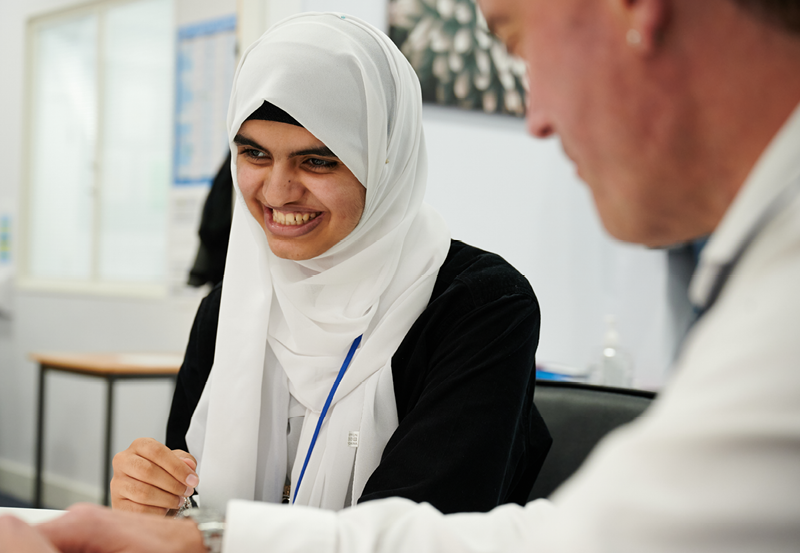COMPARING THE DIFFERENCES BETWEEN THE UAE AND UK EDUCATION SYSTEMS: A GUIDE FOR UAE STUDENTS THINKING ABOUT STUDYING IN THE UK.
15th January 24

As students from the UAE contemplate pursuing their studies in the UK, it’s crucial to understand the differences and similarities between the education systems in these two countries. Making an informed decision requires a detailed comparison, taking into account various educational stages, qualification levels, and age groups. In this comprehensive guide, we’ll break down the education systems in both the UAE and the UK, providing valuable insights to help UAE students plan their academic journey in the UK.
Pre-Primary Education: Setting the Foundation
In the UAE, pre-primary education, also known as kindergarten, is available for children aged 4 to 6. It is non-compulsory and focuses on developing cognitive, communication, social, and physical skills. In the UK, this stage corresponds to Early Years Foundation Stage (EYFS), catering to children aged 3 to 5.
Primary and Lower Secondary Education: Laying the Groundwork
Primary education in the UAE covers grades 1-4 (ages 6 to 9), and lower secondary education spans grades 5-8 (ages 10 to 14). The curriculum emphasises on core subjects, including Arabic and English.
Primary education (also known as Elementary Education – First Stage) is compulsory and is free for children of UAE nationality in public schools. English is taught from the beginning of the first year of the primary education. In order to proceed to the next stage of education, students must pass the final examinations.
Lower secondary education
Lower secondary education, also known as intermediate or “Elementary education-second stage,” spans four years, catering to students aged 10-14 and covering grades 5-8. The top 10% of the places are reserved under the Elite Programme. The Elite Programme is designed for high-achieving students, typically determined through national testing, at the lower secondary level.
The UK equivalent is Key Stages 1-3, covering ages 5 to 14. In the UK context, Key Stages 1-3 encompass primary and early secondary education, covering a broad range of subjects and developmental milestones for students between the ages of 5 and 14. Both systems share a focus on foundational knowledge and skills.

Upper Secondary Education: Pathways and Specialisations
In the United Arab Emirates, the upper secondary cycle spanning grades 9 to 12 offers two distinctive tracks: the Academic Track and the Technical and Vocational Track. The Academic Track encompasses various streams, including Elite, Advanced, and General, each designed to equip students with the necessary knowledge and skills for pursuing higher education. On the other hand, the Technical and Vocational Track introduces specialised programs in critical areas such as computing, engineering, finance, and health sciences, ensuring that students acquire practical expertise relevant to specific industries.
In the United Kingdom, a comparable educational structure is represented by the GCSE (General Certificate of Secondary Education) and A-Level (Advanced Level) system.
In the United Kingdom, students typically take their General Certificate of Secondary Education (GCSE) exams at the age of 16. These exams are usually taken in Year 11 of secondary education.
After completing their GCSEs, students may choose to pursue Advanced Level qualifications, commonly known as A-Levels. A-Levels are typically taken over a two-year period in the sixth form of secondary education, which is typically Years 12 and 13. Therefore, students taking A-Levels are usually around 18 years old when they complete their A-Level studies.
During the GCSE phase, students typically undertake a broad range of subjects, providing a foundational education across various disciplines. Subsequently, in the A-Level stage, students have the opportunity to specialise in subjects aligned with their intended university degrees and career aspirations. This pivotal stage in the UK education system serves as a bridge between secondary education and higher learning, emphasising academic depth and specialisation.
In both the UAE and the UK, the overarching goal of these systems is to prepare students for higher education and future careers. The UAE’s Academic Track and Technical and Vocational Track cater to diverse academic interests and career paths, while the UK’s GCSE and A-Level system provides a structured framework for academic exploration and specialisation, ensuring students are well-equipped for the challenges of tertiary education and the demands of their chosen professions.
The Abbey DLD Group of Colleges (ADLD) consists of three independent sixth-form colleges located in Cambridge, London, and Manchester, offering a wide range of academic study programmes. At Abbey DLD we strive to achieve the highest academic standards whilst providing a welcoming, safe and high-quality learning and boarding experience for students from around the world. We aim to help our students achieve the academic success needed to progress to the UK and the world’s top universities, whilst also developing the personal skills and qualities to succeed at university and beyond.

Curriculum
As UAE students explore the prospect of studying in the UK, understanding the curriculum differences is paramount. In the pre-primary stage, UAE’s kindergarten for 4 to 6-year-olds aligns with the UK’s Early Years Foundation Stage (EYFS) catering to 3 to 5-year-olds. Primary and lower secondary education in the UAE covers grades 1-8, emphasising Arabic and English, while the UK’s Key Stages 1-4 span ages 5 to 16 with a broad subject range. Both systems converge in their foundational approach, focusing on core skills for young learners.
Teaching Methods
In primary education, the UAE and UK both foster language skills from the start, with English as a focal point. Lower secondary education in the UAE introduces the Elite Programme for high-achieving students, akin to the UK’s Key Stages 1-3. The UK’s GCSE and A-Level system refines teaching methods, encouraging a broad exploration of subjects in the former and a specialised focus in the latter. Both systems share the goal of preparing students for higher education, emphasising academic depth and individual interests.
Assessment
Moving to upper secondary education, the UAE offers an Academic Track and Technical and Vocational Track from grades 9 to 12. This mirrors the UK’s GCSE (ages 14-16) and A-Level (ages 16-18) system, with the latter serving as a bridge to higher education. Both systems assess students through final examinations, ensuring readiness for tertiary studies. The overarching goal in both the UAE and the UK is to equip students for successful transitions into higher education and future careers, demonstrating the universality of their assessment methodologies.
British vs UAE Education System Comparison Table
| Education Stage | United Arab Emirates | United Kingdom |
| Pre-Primary Education | Ages: 4-6 Non-compulsory |
Ages: 3-5 (Early Years Foundation Stage) Emphasises cognitive, communication, social, and physical skills |
| Primary & Lower Secondary | Primary Education: Grades 1-4 (ages 6-9) this is primary only – need to add in grades and ages for lower secondary
Lower Secondary: students aged 10-14 and covering grades 5-8 Compulsory (Public schools for UAE nationals are free) |
Key Stages 1-3 (Ages 5-14)
Broad range of subjects, compulsory for Key Stages 1-3 and Key Stage 4 (Ages 14-16) |
| Upper Secondary | Grades 9-12 – age? (Age 14-18) Academic Track and Technical and Vocational Track.Various streams (Elite, Advanced, General) in Academic Track.Specialised programs in Technical and Vocational Track.Preparation for higher education |
GCSE (ages 14-16) and A-Level (ages 16-18).
Core GCSEs include Maths, English and Science. Pupils select a range of subjects reflecting their interests around these and typically achieve between 5 to 10 GCSEs. Specialisation in A-Levels based on intended university majors. Typically three A Levels are chosen. Bridge between secondary and higher education, academic depth. |
| Technical & Vocational | Grades 9-12
Applied Technology High School. Focus on industry-specific skills |
BTEC Programs
Practical, real-world skills, pathways to specific careers. Bridging academic knowledge and practical application. |
| Higher Education | Higher Colleges of Technology (HCTs)
Diplomas, advanced diplomas, higher, diplomas, bachelor’s degrees. Admission based on SSC and EmSAT. |
Universities and Colleges
Diverse academic programs, including diplomas, advanced diplomas, higher diplomas, bachelor’s degrees. Emphasis on research and innovation. |
Do You know?
Every year Abbey DLD Students achieve outstanding results and move on to join some of the world’s most prestigious and highly-ranked universities. In 2023, 41% of our A Level students and 38% of our Foundation students progressed to Russell Group Universities, and 14 of our students progressed to study at Oxbridge Colleges or Medical School.

Technical and Vocational Track: Bridging Skills and Careers
In the United Arab Emirates (UAE), students aiming for a technical or vocational trajectory have a range of options spanning grades 9 to 12. The educational landscape in the UAE has evolved to accommodate diverse career paths, with institutions providing specialised programmes in key domains such as computing, engineering, finance, and health sciences.
Drawing parallels with the United Kingdom’s educational approach, the UK places a significant emphasis on vocational education, particularly through its widely recognised BTEC (Business and Technology Education Council) programs. These programmes, offered at various educational levels, focus on practical, real-world skills and provide students with a pathway to pursue careers directly aligned with their chosen field of study.
In the UAE, the emphasis on technical and vocational education from grades 9 to 12 is indicative of a commitment to preparing students for specific industries and professions, ensuring a seamless transition from education to the workforce. Similarly, the UK’s BTEC programs are designed to bridge the gap between academic knowledge and practical application, fostering a workforce equipped with hands-on skills that meet the demands of today’s dynamic job market.
Higher Education: Bridging the Gulf
In the United Arab Emirates, the Higher Colleges of Technology (HCTs) assume a crucial role in delivering government-sponsored higher education. These institutions provide a spectrum of academic programs, encompassing diplomas, advanced diplomas, higher diplomas, and bachelor’s degrees. Admission criteria are contingent upon students’ achievements in the Secondary School Certificate (SSC) and the Emirates Standardised Test (EmSAT).
Likewise, the United Kingdom boasts a rich tapestry of higher education institutions, including universities and colleges. The educational landscape in the UK is renowned for its diversity and excellence. Students from the UAE contemplating studies in the UK typically opt for pursuing bachelor’s degrees, a credential akin to those attainable at HCTs.
The United Kingdom stands as a global hub for higher education, renowned for its venerable universities such as Oxford, Cambridge, and others. The country’s academic prowess extends across various disciplines, providing students with an enriching and globally recognised educational experience. Furthermore, the UK’s higher education system is marked by its emphasis on research and innovation, fostering an environment conducive to academic excellence.
Qualification Comparisons: Navigating the Maze
Understanding the comparability between qualifications is important for students from the UAE. In the United Arab Emirates (UAE), a diploma, advanced diploma, and higher diploma correspond to the United Kingdom’s BTEC Level 4, Foundation Degree, and Diploma of Higher Education, respectively. Notably, attaining a bachelor’s degree in the UAE denotes the successful culmination of a four-year programme, whereas in the United Kingdom, it typically spans 3 to 4 years. It is essential for international students from UAE to grasp these distinctions to navigate the educational landscape effectively.
Conclusion: Choosing Your Educational Journey
In navigating the educational landscapes of the UAE and the UK, students must consider their aspirations, career goals, and preferred areas of study. The UAE provides a robust foundation, with specialised tracks for those inclined towards technical and vocational fields. The UK, on the other hand, offers a diverse higher education experience with a global reputation for academic excellence.
Making the right choice requires careful consideration of personal preferences, future ambitions, and the alignment of educational pathways. By understanding the nuances of each system, UAE students can embark on an educational odyssey that not only enriches their academic knowledge but also prepares them for success in the global arena.
Blog Author

Wisam Afisa
Senior International Regional Manager (Middle East, Africa & Americas)
E: Wisam.Afisa@abbeydld.co.uk
T: +44 7935 133465
Get in touch today:
Since 1931, the Abbey DLD Group of Colleges has been synonymous with high-quality education, top university destinations, and enriching academic and pastoral experiences. Abbey DLD students graduate equipped with the skills to progress in their university studies and future careers, with friends from all around the world, and having made memories to remember for a lifetime.
Please note that our three colleges, each with its own unique character, all share a common goal: to deliver outstanding educational and residential experiences for students aged 13 to 21. We do not provide university-level undergraduate or postgraduate education.



